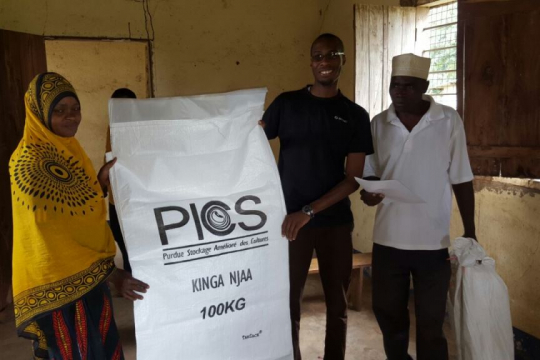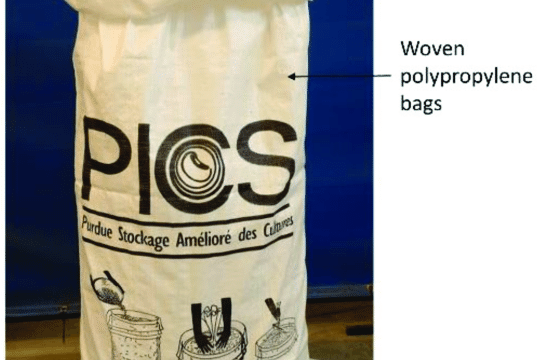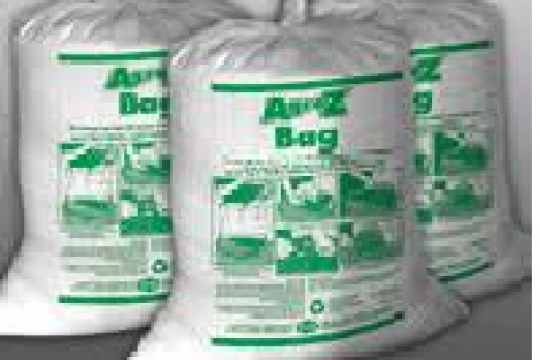The reduction of post-harvest loss (PHL), is important to address food security challenges. The rural poor who are dependent on their agricultural production requires training and storage materials like hermetic bags to increase food security. At the global level, food waste is a severe problem and a significant contributor to CO2 emissions in rich countries as well as in the Global South.
Dr. Martin Chegere and Prof. Razack Lokina, senior research fellows of Environment for Development Tanzania have published a paper titled “The impact of hermetic storage bag supply and training on food security in Tanzania”. This study analyses the impact of post-harvest management training and the supply of hermetic bags on food insecurity status in a framed field experiment setting with two treatments. Data was collected from 390 small-scale maize farmers in 21 villages in Kilosa district, Morogoro region Tanzania. Meet Dr. Martin Chegere who explains what they studied and what they learned!
How did you make your selection to avoid doubts and biases?
The selection of these villages was done after consulting the district administrative secretary and the district agricultural officer and then confirmed by respective village leaders and village agricultural officers. The selection targeted maize farming households. To minimize spillover effects from treatment groups to the control group, we assigned treatments at the village level.
How was the study conducted?
The subjects were given training manuals and a leaflet with verbal and pictorial explanations and illustrations about post-harvest and the use of hermetic bags. Farmers were informed about the possible adverse effects of not using the bags properly. For example, storing maize with high moisture content in the hermetic bags can cause fungal growth and rot all the grain in the bag; also, it was explained to the farmers that if a bag is perforated by rodents, it loses its air-proof quality. Farmers were given the number of bags that would store about 60% of their expected harvest because we did not want the farmers to end up with excess bags since that could contaminate our experiment if they try to sell or re-distribute bags that they did not need. The study was targeting Sustainable Development Goal 12 that aims to ensure sustainable consumption by, among others, reducing losses along the food chain, including PHL. We analyzed the impact of hermetic bag supply and training on postharvest management on household food security status using random selection or sampling with an element that is not changed throughout an experiment because its unchanging state allows the relationship between the other variables being tested to be better understood.
Therefore, the study provides a message to the policymakers that systematic training for smallholder farmers accompanied by the provision of storage materials like hermetic bags or other appropriate storage materials may create a tremendous impact on reducing PHL and household food insecurity. Only conducting training or merely providing farmers with storage materials like hermetic bags will not have the same effect at all. Training helps farmers to incorporate the latest scientific advances and technology tools into their daily operations. It creates awareness of new technology which increases efficiency and leads to less harm to the environment.
Why did the study not focus on large-scale farmers?
The hermetic bag technology fits small-scale farmers better because of the size of the bags (100 kg). For large-scale farmers, there are other hermetic technologies like a cocoon and metal silos that can accommodate bulky quantities. Smallholder farmers were targeted because they are most affected by PHL. Training and provision of hermetic bags are simple and economically feasible measures. Also, the cost of purchasing hermetic bags is not high. That means training and using hermetic bags can open windows for storing more farm products even for a long period.
The study provided the hermetic bags free of charge, why didn’t you let them contribute to avoiding market distortions?
The focus was not on affordability; it was on whether using the storage bags would be economically effective. So, we wanted all those who could and those who believed that they could not afford them, at that time, to be participants in the study. Farmers who had no experience in using hermetic bags before would only buy them if they perceived that they save more money than they cost. Now, this perception could be right or wrong. We wanted a fairground not driven by perception to conduct our study. Other materials than hermetic bags can be used to help farmers to store their farm produce. But the important thing is that smallholders often lack the technology and good storage materials. Some of them feel that they can’t afford to invest in those materials and build storage facilities. Therefore, if proper storage materials are introduced to them accompanied by good technology, then adoption is possible.
What economic benefits did farmers exactly get?
Farmers could lower the proportion of storage losses. The quality of their stored grain was higher so they consumed and sold better quality maize. They spent less on grain protection (chemical protectants, ashes, plants, herbs, rat traps, or rat poison). They could sell at a better price.
How do the study results differ from the previous studies that were based on the provision of hermetic bags but without training?
Our results showed a bigger impact, which implied that training improved the effectiveness of using the technology. Further studies can seek to use a more independent measure of PHL and can compare the economic viability of different techniques of reducing PHL and food insecurity in developing countries to ensure zero hunger and to ensure sustainable production and consumption.
By Salvatory Macha


